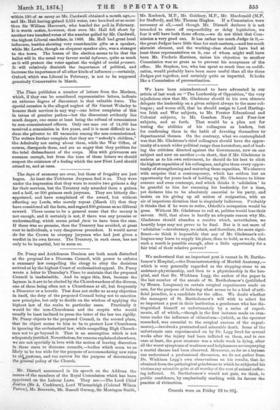We have been misunderstood to have advocated in our article
of last week on " The Leadership of Opposition," the very injudicious view that Mr. Gladstone should in his own absence delegate the leadership on a given subject always to the same col- league ; and worse still, that he should assign to Lord Harling- ton Irish and War subjects, to Mr. Forster Educational and Colonial subjects, to Mr. Goschen Navy and Poor-law subjects, and so forth. That would be a plan not for testing the abilities of his colleagues as leaders, but for confirming them in the habit of devoting themselves to' departmental themes. On the contrary, what we contemplated was that Mr. Gladstone's chief colleagues should have the oppor- tunity of a much wider political range than heretofore, and of lead- ing the criticism directed against the Government, now on one subject and now on another ;—in short, that if Mr. Gladstone is serious as to his own retirement, he should do his best to elicit the highest capacities of his colleagues, and give them every oppor- tunity of strengthening and maturing those capacities. We observe with surprise that a contemporary, which has seldom lost an opportunity for years back of holding up Mr. Gladstone to bitter censure and even contempt, and which thinks it ' adulation' to be grateful to him for resuming his leadership for a time, yet declares him to be absolutely essential to his party, and insists on his giving up all notion of resignation, with an air of imperious dictation that is singularly ludicrous. Probably it thinks that if he were to retire, Othello's occupation would be gone. Without Mr. Gladstone to rail at, politics would lose their savour. Still, that alone is hardly an adequate reason why Mr. Gladstone should abandon a resolve which, nevertheless, we heartily hope may not prove to be final. But is it not more of
adulation'—involuntary, we admit, and therefore, the more signi- ficant—.to think it impossible that any of Mr. Gladstone's col- leagues may learn to supply his place, than to hold, as we do, that such a result is possible enough, after a little opportunity for a. fair trial of their relative powers ?






































 Previous page
Previous page